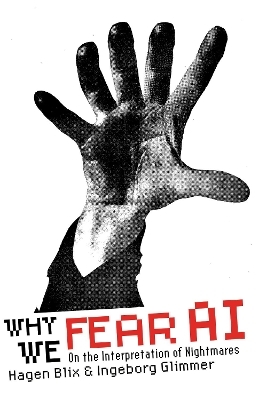
Why We Fear AI
Common Notions (Verlag)
978-1-945335-17-4 (ISBN)
- Titel nicht im Sortiment
- Artikel merken
Why We Fear AI boldly asserts these fears are actually about capitalism, reimagined as a kind of autonomous intelligent agent. Hence, Hagen Blix and Ingeborg Glimmer argue, we need to understand these fears in terms of the political threats and opportunities in the current moment, rather than a distant and abstract future. To do so, we need to explore their meaning through the lens of class: the fear of an AI uprising may actually be about alienation for the working class (the tools we made returning as an alien and oppressive power), but equally about fears of revolt and revolution for the ruling class (the labor that they have control over emancipating itself).
The aim of Why We Fear AI is radical and simple: to develop political analyses and counterstrategies that highlight the divergence of material interests in high-tech digital capitalism, and thus provide fruitful ground for a class-based politics around these new technologies—and new worlds.
Hagen Blix is a cognitive scientist, whose research is at the intersection of language, cognition, and political economy. Hagen’s work is in applied linguistics, specifically artificial intelligence and natural language processing models (BERT, ChatGPT, Google Bard, etc). Ingeborg Glimmer is an AI researcher. They have published widely in the fields of natural language processing, neuroscience, psychology, and linguistics. Ingeborg Glimmer is a pen name.
Part I – Today’s World, Today’s AI
1. Introduction
We introduce recent advances in AI and a number of public reactions to them, ranging from hopes that they will “solve climate change” or “automate science” to fears that they will enslave or even exterminate humanity.
2. Capital, Will, and Artificial Intelligence
Discusses the only form in which technology has hitherto been “autonomous”: as capital with a drive towards profit. This drive exists as a structural condition beyond people’s individual control and desires––but with modern language models’ arrival, we can project it onto a particular technology. Hence, when we anthropomorphize AI in our fantasies, we may be anthropomorphizing our experience of capital(ism).
3. There is No Alternative (Resistance is Futile)
Our experience of information technology dovetails with that of being governed under neoliberalism. We trace this technological development from the first transistors to modern AI. The increasing specialization of technological knowledge correlates with an increasingly technocratic-specialist approach to politics. Hence, the imaginations about AI are prone to reflect a particular experience of governance.
Part II – (Dreams + Nightmares) / Class
4. Saving the World and the End of Politics
AI is already a tool used for surveillance, control, manipulation, or deskilling, and capitalism is already destroying the planet and our future ability to live. This is reflected in fears people have about these technologies becoming more powerful (whether they are imagined to be “sentient” or not). We highlight how speculations about future AI as seen from the perspective of working people, reflect life under neoliberal-technocratic capitalism.
5. Which Side are You On?
On the one hand, the technocratic nightmare of the working class is the dream of the class that produces the means of control necessary for such a system (and which appears to them as exercising their agency to make society more ‘rational’)––hence, when they imagine the same benevolent AI that “saves the world,” as the working class does, it does not reflect a lack of agency, but its apex. On the other hand, the same technologies expose a new potential for deskilling the professional class itself, thus threatening to morph into means of controlling them, rather than simply being the means of control which draw them to the side of power.
6. Aristotle’s (Fever) Dreams
Capitalists dream of realizing Aristotle’s justification for slavery in ancient Greece––that “natural slaves” understand reason but do not possess it––through technological advancement. They dream of leaving the rest of humanity behind, of becoming one with capital in the form of immortal machines. They dream of developing the means of production through automated science without scientists, through a twisted version of science that lacks the possibility of critique. Today, it is crucial to claim the narrative, to tell our stories, to do our class politics.
Part III – Where We Go From Here
7. Technofascist Dangers
Where we discuss the dangers that arise out of the professional class responding to their nightmares, instead of the actual threats. We will focus on how the paternalism of technocratic movements like “Effective Altruism,” which merely veils violence with faux care, provides fertile ground for worries about “extinction risk” from AI. In some of these outgrowths, the nightmares discussed so far get combined with a series of colonialist and white supremacist arguments. The goal of this chapter is to lay these things bare, and offer strategies to make the professional class reconnect with reality instead of ideology.
8. Seizing the Means of Prediction and Other Opportunities
We try to lay out the possibility of having AIs not as capital, but as collectively owned means of production and distribution. We address the situation from the perspective of the professional class (whose ambiguity comes with dangers, but also opportunities––they have genuine reason to join the struggle, if they can be made to see through the obfuscation), and the working class. We discuss what might be necessary to get to a world of collective ownership (organizing the collective agency that is currently lacking), and why the myths we’ve discussed might actually help to make clear the issues and dangers that we face, if we can seize the moment.
| Erscheint lt. Verlag | 7.5.2025 |
|---|---|
| Zusatzinfo | Illustrations |
| Verlagsort | Matawan |
| Sprache | englisch |
| Maße | 152 x 228 mm |
| Themenwelt | Sozialwissenschaften ► Soziologie |
| Technik ► Elektrotechnik / Energietechnik | |
| Wirtschaft ► Volkswirtschaftslehre | |
| ISBN-10 | 1-945335-17-3 / 1945335173 |
| ISBN-13 | 978-1-945335-17-4 / 9781945335174 |
| Zustand | Neuware |
| Haben Sie eine Frage zum Produkt? |
aus dem Bereich


